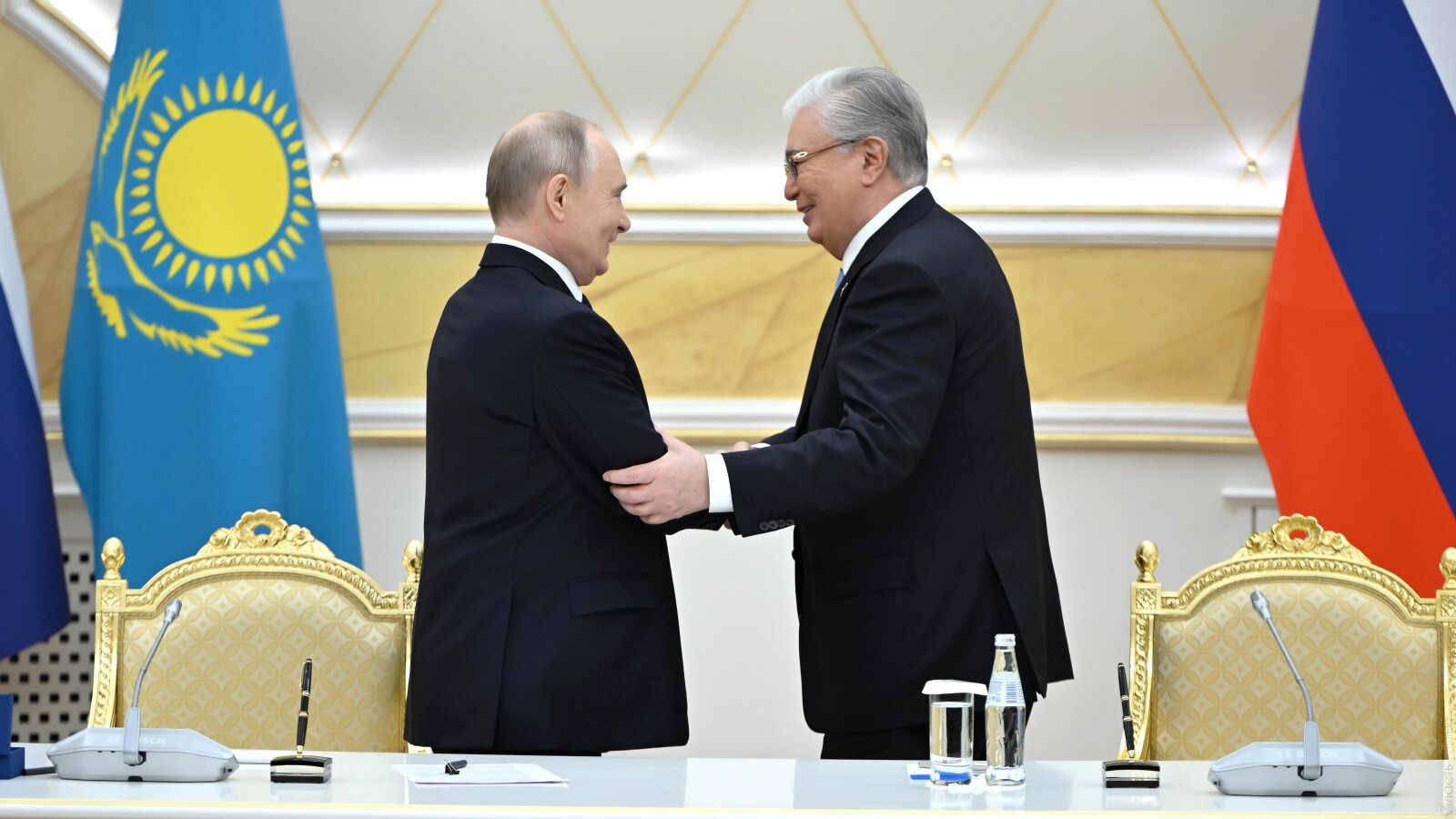- ВКонтакте
- РћРТвЂВВВВВВВВнокласснРСвЂВВВВВВВВРєРСвЂВВВВВВВВ
“Despite unprecedented global challenges, our countries are an example of good neighborliness and multifaceted cooperation,” Kazakhstan’s President Kassym-Jomart Tokayev said on November 27, during a meeting with Russia’s President Vladimir Putin. Putin flew to Astana for an official visit and to attend the annual meeting of member countries of the Collective Security Treaty Organization, a military alliance formed by Armenia, Belarus, Kazakhstan, Kyrgyzstan, Russia, and Tajikistan.
During Putin’s visit on November 28, hackers were able to change the script to an LED screen at a busy intersection in Astana to show the colors of the Ukrainian flag. The screen was soon turned off and rebooted, but the act was deemed a reaction to Russia’s war of aggression in Ukraine and the warm welcome Putin received from Kazakhstan’s officials.
Talking to the press on November 28, Putin said that Rosatom would be ready to build Kazakhstan’s first nuclear power plant, should the government choose to assign the project to Russia’s state-owned nuclear company. Putin also said that “as a rule, we don’t simply build a power plant; we build the whole industrial complex.”
Goods traded between Russia and China could transit across Kazakhstan via a prospective transport and logistics center in Astana, the national railway company said on November 28. Russia is also poised to use Kazakhstan’s territory to develop a pipeline system to pump gas to China, according to officials.
Due to a sharp weakening of the tenge currency, the Central Bank increased the main interest rate by 100 basis points to 15.25% on November 29, interrupting an interest rate-cutting trend that started in July last year. The regulator also said it carried out operations for around $1 billion in the past two weeks to stabilize the exchange rate with the US dollar. Over the past week, the tenge lost 2.7% against the dollar and is now trading at 512.5/$1, just above the previous negative record of March 2022.
Repairs at large oil fields led to a lower forecast for this year’s oil production, the ministry of energy said on November 25. Minister Almasadam Satkaliyev told Parliament that production this year should amount to 88.4 million tons (1.9 million tons, or 2% less than forecasted). In 2023, Kazakhstan produced 90 million tons. Kazakhstan has routinely exceeded the production quota that the OPEC+ group of exporters set, but the current decrease in production could allow Kazakhstan to stay within the limit.
On November 25, Satkaliyev also told Parliament that the country’s fourth refinery should be built by 2032. While the location has not yet been selected, the minister said it would likely be built in the west of the country. The question of the construction of a fourth refinery in Kazakhstan has been discussed for years, against the backdrop of seasonal gasoline shortages and aging infrastructure.
State oil and gas company Kazmunaigas said on November 25 that it will pay 350 billion ($677 million) in dividends in 2024. The Central Bank, which bought a 20% stake in the company as well as a 12% stake in uranium producer Kazatomprom in recent years, said on November 27 that the purchases accrued income for more than 530 billion tenge ($1 billion). Chairman Timur Suleimenov, however, said the purchase of state-owned companies’ shares is an “unstable instrument” for public finances.
Should oil prices fall below $40/barrel, Kazmunaigas said on November 25 that it would not lay off its personnel. “We are socially oriented, this is our first task," Askhat Khassenov, the chairman, told Vlast. While the company has set scenarios for $40/barrel, the ministry of economy’s worst case scenario is only set at $60/barrel, according to the latest official documents.
A fraction of the striking oil workers in the western town of Zhanaozen went back to work, ending a two-week strike on November 25. The management of the company said the following day that they would be given a 50% compensation for the days they missed, while those who are still striking will not receive any pay for the days they did not work. On November 29, oil service workers at Samruk Business Academy, an outstaffing company contracted by service enterprise Oil Construction Company (OCC), went on strike in the nearby city of Aktau, asking for permanent staff contracts with OCC.
The government allocated 100 million tenge ($193,000) to scientific research on the health effects of the unification of time zones in Kazakhstan. Last week, around 200,000 people filled out a survey on the time zone at Kazakhstan’s e-government platform. On November 27, the ministry of health said it would publish the results of the survey in three years, once scientists publish their findings. Kazakhstan’s government decreed to unify the country’s two time zones on March 1.
Zhaksylyk Omar, the mayor of the north-eastern city of Oskemen, resigned on November 27 after being targeted with criticism regarding the city’s problems with air pollution. The previous day, record air pollution hit the city and flights had to be rescheduled, and the following day school classes were held online. Yermek Kosherbayev, the governor of the region of which Oskemen is the capital, said on November 28: “I cannot say that there is no [air pollution] when I myself start coughing if I go outside.”
The town of Kentau, in the southern region of Turkestan, was categorized as an “environmental disaster zone” on November 28, the mayor said. The decision came on the back of an inspection by the local health and ecology commission. The mayor also said the government will allocate 6 billion tenge ($11.6 million) to local residents as compensation. Once a growing mining town, Kentau has witnessed an economic decline in recent decades.
The authorities blocked the website of Kazakhstan’s Youth Information Service, the NGO said on November 28. On March 1, the ministry of culture received a note from law enforcement officials concerning potential illicit activities linked to the website. The NGO, which helps young people navigate human and civil rights, denies the accusations.
Поддержите журналистику, которой доверяют.









